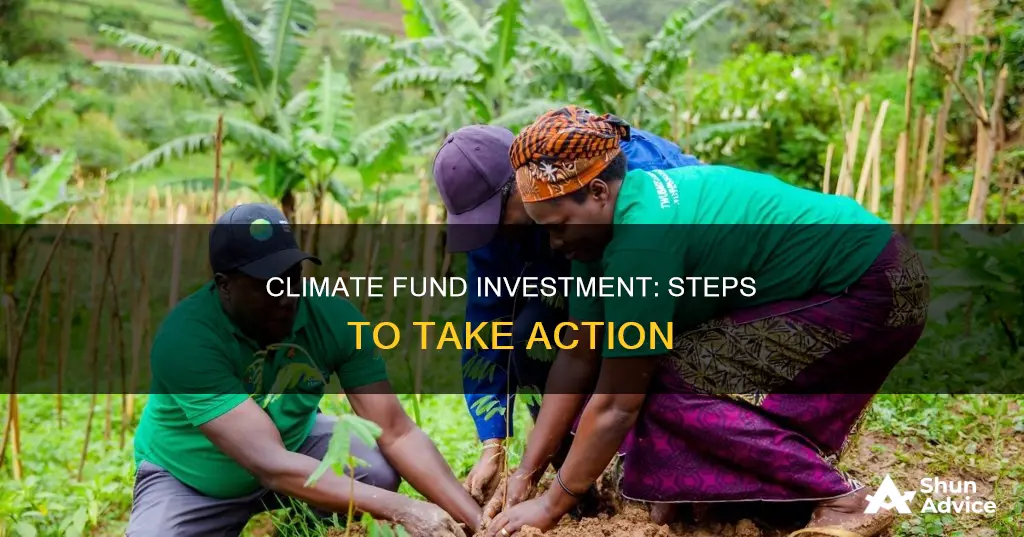
Climate change is an increasingly pressing issue, and investors are taking note. Climate investments fall within the realm of environmental, social, and governance (ESG) investing, which seeks to accomplish positive social benefits alongside profits. As the world transitions away from fossil fuels, climate investing supports technologies and companies that are likely to become important in this new landscape. While climate investments have traditionally had lower returns, this gap is closing, and investors are presented with a growing number of opportunities.
What You'll Learn
- Invest in green technology and renewable energy
- Invest in green initiatives, like carbon offsets or electric vehicles
- Invest in companies with green energy initiatives
- Invest in funds that support technologies or companies that are likely to become important in a world transitioning away from fossil fuels
- Invest in companies that are seeking lower-carbon alternatives

Invest in green technology and renewable energy
The world is going green, and investors are seeking opportunities to put their money into eco-friendly investments that benefit the environment. Green investing is about seeking out investment opportunities that will also have a positive impact on the natural environment.
One of the major destinations for green funding is renewable energy technologies, such as wind, solar, and hydropower. These sources of energy are crucial in reducing our reliance on fossil fuels and combatting climate change.
Green Transportation
Another emerging green technology is electric vehicles, which are reducing our consumption of fossil fuels. This sector is growing rapidly, with electric vehicle sales surging and the associated infrastructure for charging and maintenance expanding.
Green Energy Stocks
There are many companies focused on renewable energy, putting them in a great position to benefit from this megatrend. Here are some examples of top-tier green energy companies:
- NextEra Energy: One of the world's largest producers of wind and solar energy. It has an excellent track record of creating shareholder value, with a total return of over 225% in the past decade.
- Brookfield Renewable: A global leader in renewable energy and one of the world's largest producers of hydroelectric power. The company has a strong track record of increasing its dividend payments and funds from operations per share.
- Clearway Energy: One of the largest owners of renewable energy generating facilities in the U.S., with a portfolio of wind, solar, and natural gas-powered facilities.
- First Solar: A leading producer of thin-film solar panels, ideal for utility-scale solar energy projects. First Solar has a strong balance sheet and the financial flexibility to expand and meet the increasing demand for solar panels.
- SolarEdge Technologies: Develops and manufactures an optimized inverter system that maximizes the power produced by solar panels, helping to lower costs.
Green Energy Funds and ETFs
If you're looking for a more diversified investment approach, you can consider investing in mutual funds or exchange-traded funds (ETFs) that focus on renewable energy and green technology. Here are some examples:
- Invesco Solar ETF (TAN): One of the biggest renewable energy ETFs with $1.2 billion in assets under management.
- First Trust NASDAQ Clean Edge Energy Index Fund (QCLN): With $727.8 million in assets under management, this fund provides exposure to companies in the clean energy sector.
- Invesco WilderHill Clean Energy ETF (PBW): This ETF has $333.3 million in assets under management and invests in businesses in the clean energy space.
Risks and Considerations
While investing in green technology and renewable energy can offer great potential, there are a few things to keep in mind. Firstly, green investments have historically offered lower returns compared to traditional investments due to the additional costs of upholding environmental, social, and governance (ESG) criteria. However, recent research suggests that this gap is closing.
Additionally, investing in any new technology comes with risks, and it's important to do your research to avoid "greenwashing," where a company claims to be green but actually falls short. Diversification is key, and managed ETFs and mutual funds can help in this regard.
Final Thoughts
By investing in green technology and renewable energy, you can not only increase your personal wealth but also contribute to making the world a better place through socially responsible investing. Remember to consider your financial commitment, risk tolerance, and goals while supporting environmental sustainability.
Fund Setter: Minimum Investment Requirements and More
You may want to see also

Invest in green initiatives, like carbon offsets or electric vehicles
Investing in green initiatives, like carbon offsets and electric vehicles, is a great way to contribute to the fight against climate change while also seeking profitable investment opportunities. Here are some ways to approach such investments:
Carbon Offsets and Credits
Carbon credits are issued by governments or organizations, allowing the holder to reduce their greenhouse gas emissions. The idea is that investors can purchase these credits to offset their carbon footprint, with the funds being directed towards projects that actively reduce carbon emissions. The voluntary carbon market is still in its early stages, but it is expected to grow significantly to meet the targets set by the Paris Agreement. As such, investing in carbon credits and related funds can be a way to get involved in this market.
There are a few ways to invest in carbon offsets and credits:
- Carbon Mutual Funds and ETFs: These are funds with diversified holdings that invest in companies with low-carbon or net-zero commitments. They offer a lower-risk way to gain exposure to the carbon markets, but potential returns may also be lower. Examples include the iShares MSCI ACWI Low Carbon Target ETF (CRBN) and BlackRock's U.S. Carbon Transition Readiness ETF (LCTU).
- Green Funds: These funds focus on industries like electric vehicle manufacturers, renewable energy suppliers, and green tech companies. They provide more direct exposure to the carbon markets and can include companies that are already net-zero or net-negative emitters. Examples include the iShares Global Clean Energy ETF (ICLN) and the First Trust NASDAQ Clean Edge Green Energy Index Fund (QCLN).
- Carbon Credit Futures: This option provides the most direct exposure to the voluntary carbon markets but is also more complicated and risky. It involves purchasing carbon credit futures, such as European Union Allowance futures.
Electric Vehicles and Green Transportation
The electric vehicle (EV) market is closely tied to the broader shift towards renewable energy and green initiatives. As such, investing in EV manufacturers and related companies can be a way to support and benefit from this transition. Some companies to consider include:
- Tesla (TSLA)
- NIO Inc. (NIO)
- Brookfield Renewable Partners (BEP)
When investing in this space, it is important to consider the technology and services offered by these companies, their track record of meeting goals and objectives, and the compatibility of their offerings with other energy sources.
Investing in Vanguard: Target Retirement Funds Explained
You may want to see also

Invest in companies with green energy initiatives
Green investing is about finding investment opportunities that also benefit the natural environment. Renewable energy technologies, such as wind, solar, and hydropower, are a major destination for green funding.
There are several companies with strong green energy initiatives that you can invest in. Here are some examples:
Iberdrola SA (IBDRY)
Iberdrola is a Spain-based multinational electric utility company that engages in the generation, distribution, and trading of electricity. It specializes in clean energy, including onshore and offshore wind, pumped hydro, solar photovoltaic, and battery storage. The company has an international presence in several countries, including the US, UK, Mexico, Brazil, Portugal, Greece, Japan, and Australia.
NextEra Energy (NEE)
NextEra is a diverse company that provides wholesale power generation and operates power plants. Its customers include retail and municipal electricity providers, industrial corporations, and power cooperatives. The company invests billions in renewable energy sources and is one of the world's largest wind and solar energy generators. It also has other energy sources in its portfolio, such as nuclear power and natural gas.
Brookfield Renewable Corp. (BEPC)
Brookfield Renewable is a Canada-based company that owns and operates renewable power assets worldwide. While its primary focus is on hydroelectric power operations, it also owns and operates wind, solar, distributed generation, and storage facilities.
Vestas Wind Systems A/S (VWDRY)
Vestas Wind Systems is a Denmark-based wind energy company that develops, manufactures, and installs wind turbines globally. The company also operates a service segment that provides service contracts, spare parts, and related activities.
Jinko Solar Holding Co. Ltd. (JKS)
Jinko Solar is a China-based solar power company that manufactures solar energy products, including silicon ingots and wafers, solar cells, and solar modules. The company also provides solar system integration services to customers in the US, Europe, Asia, Africa, and Latin America.
First Solar (FSLR)
First Solar is a leading producer of thin-film solar panels, which use their larger size to generate more energy than competing technologies. As one of the world's leading solar panel makers, the company is well-positioned to meet the accelerating demand for solar panels.
SolarEdge Technologies (SEDG)
SolarEdge Technologies develops and manufactures an optimized inverter system that maximizes the power produced by solar panels, helping to lower the cost of energy generated by the system. The company has also expanded into other smart energy solutions, such as EV charging, batteries, and grid services.
These companies are all well-positioned to benefit from the global shift towards renewable energy and present attractive investment opportunities for those looking to invest in green energy initiatives.
What Makes Debentures Attractive for Surplus Fund Investments?
You may want to see also

Invest in funds that support technologies or companies that are likely to become important in a world transitioning away from fossil fuels
Climate investments support technologies or companies that are likely to become important as the world transitions away from fossil fuels and carbon-intensive industries. These investments fall within the realm of environmental, social, and governance (ESG) investing, which seeks to accomplish positive social benefits as well as profits.
Many funds and companies are investing in alternative energy sources, such as solar and wind power, that can replace fossil fuels. For example, the Climate Investment Funds (CIF) have pledged $12.1 billion, investing in clean energy initiatives such as wind and solar power in Thailand. The Green Climate Fund (GCF) is another example of a large climate fund, which focuses on developing countries.
Another possible investment route is green initiatives, such as carbon offsets, electric vehicles, or sustainable materials. For instance, the Infrastructure Investment and Jobs Act in the US earmarks substantial expenditures for green initiatives such as renewable energy sources, public transit, and clean water.
Climate investments have traditionally had lower returns, but studies suggest that the gap is closing. As regulators increase the cost of using fossil fuels, environmentally-friendly technologies are becoming more profitable.
Strategies for Investing in US-Based Hedge Funds
You may want to see also

Invest in companies that are seeking lower-carbon alternatives
Investing in companies that are seeking lower-carbon alternatives is a great way to support the transition to a more sustainable future. Here are some ways you can invest in these companies:
Renewable Energy Producers
One of the most well-known investment routes is through renewable energy companies, particularly those focused on solar, wind, and hydropower. These companies are working to replace fossil fuels with natural energy sources, such as wind and solar power, to provide inexpensive and clean electricity. Some specific companies to consider include:
- General Electric (GE)
- NextEra Energy Partners (NEP)
- Siemens Gamesa Renewable Energy (GCTAY)
- Vestas Wind Systems (VWDRY)
- First Solar (FSLR)
- JinkoSolar Holding (JKS)
- Sunpower (SPWR)
Additionally, you can invest in renewable energy exchange-traded funds (ETFs) such as the First Trust Global Wind Energy ETF (FAN) and Invesco Solar ETF (TAN).
Green Transportation
Another area to consider is green transportation, which aims to reduce fossil fuel consumption through electric vehicles. A well-known leader in this space is Tesla (TSLA). There are also companies working with fuel-cell technology to power vehicles, such as Ballard Power Systems (BLDP) and FuelCell Energy (FCEL).
Pollution Control and Waste Reduction
The pollution control industry is on the rise, as it responds to legislation mandating a reduction in harmful chemicals released into the environment. Companies in this sector include:
- VanEck Vectors Environmental Services ETF (EVX)
- Invesco MSCI Sustainable Future ETF (ERTH)
Sustainable Agriculture
Agriculture is a major contributor to carbon emissions, but there are ways to reduce its ecological footprint. Organic farms, for example, avoid the use of pesticides and hormones, and engage in sustainable farming practices. United Natural Foods (UNFI) is one of the biggest organic food companies and may be worth considering for investment.
Water Infrastructure
With the fear of the world running out of freshwater due to climate change, water infrastructure is another important area to consider for investment. Some companies to look into include:
- American Water (AWK)
- Essential Utilities (WTRG)
- Invesco Water Resources Portfolio ETF (PHO)
- Invesco Global Water Portfolio ETF (PIO)
- First Trust Water ETF (FIW)
- IShares U.S. Utilities Index ETF (IDU)
Best Countries to Invest in Mutual Funds
You may want to see also
Frequently asked questions
Climate investing is a form of environmental, social, and governance (ESG) investing, which seeks to accomplish positive social benefits as well as profits. Climate investing supports technologies or companies that are likely to become important as the world transitions to cleaner energy sources and moves away from carbon-intensive industries and fossil fuels.
Examples of climate funds include the Green Climate Fund (GCF), the Climate Investment Funds (CIF), and the Breakthrough Energy Ventures (BEV) fund.
Climate funds invest in a variety of sectors, including renewable energy, green technology, electric vehicles, pollution control, waste reduction, agriculture, and more.
Climate investments tend to have lower returns compared to traditional investments, but some studies suggest that the gap is closing. Additionally, climate-themed funds have a relatively short history, making it challenging to assess their long-term performance. However, as governments and companies face more pressure to address climate change, those finding solutions are expected to yield strong returns.







